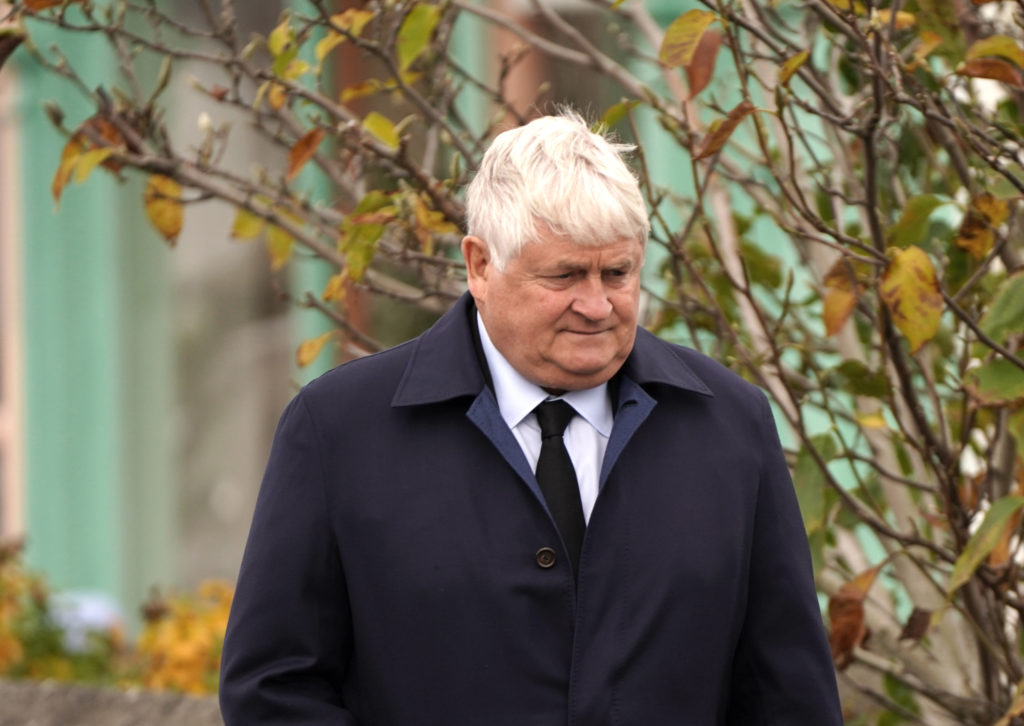

It has now been determined that there was nothing underhanded concerning the sale of Siteserv to Denis O’Brien-led company Millington.
The deal completed in 2012, saw the company acquired for €45 million in good faith.
However, for a decade, the sale to O’Brien has been mired in controversy and accusations being made about his business practices.
O’Brien is one of Ireland’s leading business personalities and features regularly as one of the country’s most wealthy personages.
For his accomplishments and his track record of giving opportunities to Irish people in a variety of companies, one would have thought that he would be lauded and revered.
But he is not.
He is viewed with suspicion and begrudged. His business dealings are scrutinised and there seems to be an unwillingness to celebrate him.
Why?
He is the son of a hardworking entrepreneur who he learnt so much from. His mother infused him with social responsibility, a sense of justice and addressing the needs of those less fortunate. He is a passionate advocate of education and is given the chance to work the alchemy of ambition, drive and wherewithal into successful enterprises.
Yet he is reviled and feared.
With all the accusations and finger-pointing, none have ever been substantiated.
For years, I have thought, why is Denis so litigious? Why not let the dogs bark and ignore it all? There are better things to do with your time.
But if you are constantly maligned and your reputation dragged through the mud with billions at stake, I guess you see things through a different prism.
Denis O’Brien is not some curmudgeonly tycoon who is socially awkward.
Quite the contrary, he can be generous, humourous, a good sport and reads people well.
Yet somehow, Ireland’s elite doesn’t see this from a man who has built businesses all over the world and put Ireland on the map.
Confronted with an incessant barrage of vitriol and venomous tongues always in your face, there’s only so much a man can take.
You can’t hide behind the cape of parliamentary privilege and destroy a man’s reputation without substantiating your claims. That is so wrong on many levels.
That degree of mendacity should not be allowed to go unchecked.

Back in 2015, Denis O’Brien wrote an open letter entitled “I have never experienced this level of hatred.”
It makes for essential reading on how as they say in Jamaica, “bad mind” people have so much things to say.
He is one of Ireland’s most accomplished sons but yet people don’t show him love and respect, instead, they want to nail him to the cross.
In this letter, O’Brien writes: “I have never experienced the level of abuse, venom and hatred resulting from taking a stand to protect privacy in relation to my financial affairs.
“Over time, I do really hope that the anger and nastiness which fuels the current discord will abate and be replaced by a positive and constructive outlook for the country.
“I will always be proud to be Irish, optimistic and a republican with a small “r”.
The Government report that came out last week makes it clear that Catherine Murphy got it wrong and that there was no “cosy” or “favourable” interest rate in the Siteserv deal.
In other words, she can’t blow on a smoking gun.
Murphy chose to double down and said the report reveals “ a devasting chronology of a tainted deal”.
OK, but where is your proof? Why hide behind parliamentary privilege and allow a rich man to pick up the tab?
Below is Denis O’Brien’s response to the Siteserv Report:
“The Report of the IBRC Commission of Investigation, set up seven years ago in 2015 to investigate certain transactions conducted by IBRC’s new management team, including the purchase of Siteserv by a company owned by me, has clearly established there was no basis in fact to serious allegations made by Deputy Catherine Murphy TD about me under Dáil privilege in 2015 and 2016.
We wrote to Deputy Murphy a number of times refuting her many wide ranging allegations. She ignored this correspondence as the facts did not fit with her agenda.
Addressing the Dáil on 21 April 2015, Deputy Murphy stated that I had a personal friendship with the IBRC executive, who was responsible for setting my interest rates. This allegation is entirely false, as has been established by the Commission’s Report.

In the same speech, she claimed that my company, Millington, received a letter from the same IBRC executive telling me what to bid and that I added a €5m “sweetener” as part of the process. Similarly, these allegations are entirely false. It is clear from the Commission’s report that Millington had no role whatsoever in the decision to pay the shareholders.
It is also clear from the report that the sale of Siteserv to me was in fact approved by all the independent directors and advisors including KPMG, Davy, the Chairman (Hugh Cooney, deceased), Robert Dix, Patrick Jordan, IBRC and its independent representative, Walter Hobbs, who were all aware of competing bids and risks attaching to them in a very challenging economic environment at the time in 2012.
Headed by Mr Justice Brian Cregan, the Commission sought to compel Deputy Murphy to testify before it, but she repeatedly refused.
It begs the question: Why? Deputy Murphy knew that those individuals who gave her false information about me would not be identified, but she still chose not to attend to give evidence. I stand over the statements I made when the allegations were first made: Deputy Murphy used Dáil privilege to make false allegations about me.
I am surprised the Report makes no criticism of Deputy Murphy’s decision not to appear before it as a witness, particularly in light of the Commission’s own acknowledgement that Deputy Murphy’s non-attendance denied parties, against whom she made very serious false allegations, their right to fair procedures.
Seven years later and at a cost estimated to be in excess of €30m, the Commission has furnished its report to the Government.
Three years ago, Micheál Martin TD, then Fianna Fáil leader, months before he became Taoiseach, voiced his concerns at the length of time the Commission was taking: “It is quite shocking on any reasonable level that it would take so long to investigate a transaction with the objective of ascertaining whether value was achieved for the taxpayer. To call a spade a spade, whatever one says and whatever one’s views are, this has not worked out in terms of the objective of investigating one transaction.”
Events since Deputy Murphy’s Dáil utterances in 2015 / 2016 indicate that a Dáil deputy can use Dáil privilege to:
- Make false allegations in the Dáil without any supporting evidence and choose to ignore information given to her to the contrary;
- Secure Dáil support for the setting up of a Commission of inquiry on the basis of the false allegations;
- Decide not to cooperate with the Commission without any accountability as a public representative.
This highlights again the potential for the misuse of Dáil privilege by a Dáil deputy and anonymous individuals, an issue which was addressed by the former Minister for Justice, Frances Fitzgerald, when she said, “We must change how our legislature, media and public interact. Starting with our rules of parliamentary privilege. Politicians must have the scope to debate without fear. But with that scope comes responsibility. We already constrain certain terms and language – it’s high time to censure those who wilfully use privilege to smear.”
In a separate Tribunal of Inquiry, the Disclosures Tribunal, Mr Justice Charleton noted in his report concerning one particular module that inquiries can arise, causing significant expense to the Irish taxpayer, where politicians receive allegations of wrongdoing without hearing the other side of the story.
I agree with this sentiment and believe greater consideration is needed at the start of a concern, to properly screen what actually needs investigating, rather than creating so much political pressure through unaccountable allegations in the Dáil, that the taxpayer ends up in the position it is today – with €30 million in legal costs over a single transaction that concluded over a decade ago.
There is a fundamental issue of justice denied where a citizen is forced to incur very substantial legal costs to fight to protect their good name and reputation where an elected representative, under the cloak of Dáil privilege, makes false allegations against them.
Tens of millions of euros in legal fees have been incurred as a result of this Commission. Those against whom the most injurious and false allegations have been made must bear the brunt of their costs as even the Commission has acknowledged that the legal fees to be discharged by the State are completely insufficient.

In the future, there should be a mechanism in place by which a Commission could seek Dáil approval to stand down its work in the event that a person or persons making unsubstantiated allegations under Dáil privilege refuses to give evidence and fails to furnish documentary evidence supporting the allegations.
Dáil privilege is a central pillar of our democracy. Dáil privilege, however, should not be used as a tool of political weaponry to be called into service for political advancement where the truth is the ultimate price.
In this context, I recall An Taoiseach, Micheál Martin, engaging in a trenchant stand against Sinn Fein’s Mary Lou McDonald some years ago when she used Dáil privilege to release names of former cabinet and Fianna Fáil colleagues wrongly associated with the Ansbacher tax-avoidance scheme.
At the time the allegations by Deputy Murphy were first aired, I said I respected the concept of Dáil privilege, and I still do.
However, in its current form, Dáil privilege can be misused by an elected representative in Dáil Éireann, as is evidenced by the allegations made against me by Deputy Murphy TD. There is one certainty – it is that it is only a matter of time before Dáil privilege will be manipulated like this again.
I believe that the Houses of the Oireachtas must introduce new regulations whereby misuse of Dáil privilege is immediately investigated and appropriate sanctions imposed.”







Comments